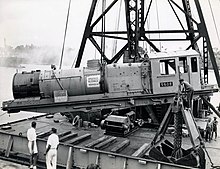From Wikipedia, the free encyclopedia
East African Railways 60 class No. 6019 at
Tabora depot, Tanzania, in 1968
Specifications Configuration: • Whyte 4-8-2+2-8-4 Garratt ) • UIC (2′D1′)(1′D2′) h4 Gauge 1,000 mm 3 ft 3+ 3 ⁄8 in )Driver dia.48 in (1,219 mm) Adhesive weight 86.9 long tons (88.3 t) Loco weight 152.3 long tons (154.7 t) Fuel type Oil Fuel capacity 1,800 imp gal (8,200 L; 2,200 US gal) Water cap. 4,612 imp gal (20,970 L; 5,539 US gal) Firebox: • Grate area 48.8 sq ft (4.53 m2 ) Boiler pressure 200 psi (1.38 MPa) Heating surface: • Firebox 170 sq ft (16 m2 ) • Tubes 2 ) • Total surface 2,269 sq ft (210.8 m2 ) Superheater: • Type Inside • Heating area 370 sq ft (34 m2 ) Cylinders 4 (Garratt) Cylinder size 16 in × 24 in (406 mm × 610 mm) Valve gear Walschaerts Loco brake Westinghouse type Train brakes Westinghouse type
Career Operators East African Railways (EAR)Class 60 class Number in class 29 Numbers 6001–6029 First run 1953 Disposition One preserved; others scrapped
The EAR 60 class , also known as the Governor class , was a class of 1,000 mm 3 ft 3+ 3 ⁄8 in ) gauge 4-8-2+2-8-4 Garratt -type articulated steam locomotives built for the East African Railways as a development of the EAR's existing 56 class .
The 29 members of the 60 class were ordered by the EAR from Beyer, Peacock & Co. The first 12 of them were built by sub-contractors Société Franco-Belge in Raismes (Valenciennes ), France, and the rest were built by Beyer, Peacock in Gorton , Manchester , England. The class entered service in 1953-54.
Initially, all members of the class carried the name of a Governor (or equivalent) of Kenya , Tanganyika or Uganda , but later all of the Governor nameplates were removed.
The builder's and fleet numbers, and initial names, of each member of the class were as follows:
A 60 class locomotive being unloaded at Mombasa , Kenya, prior to entering service
Durrant, A E (1981). Garratt Locomotives of the World David & Charles . ISBN 0-7153-7641-1 OCLC 9326294 . Durrant, A E; Lewis, C P; Jorgensen, A A (1981). Steam in Africa . London: Hamlyn . ISBN 978-0-600-34946-4 OCLC 9014344 . OL 15088099M . Wikidata Q111363476 . Patience, Kevin (1976), Steam in East Africa: a pictorial history of the railways in East Africa, 1893-1976 , Nairobi: Heinemann Educational Books (E.A.) Ltd, OCLC 3781370 , Wikidata Q111363477 Ramaer, Roel (1974). Steam Locomotives of the East African Railways . David & Charles Locomotive Studies. Newton Abbot, North Pomfret: David & Charles . ISBN 978-0-7153-6437-6 OCLC 832692810 . OL 5110018M . Wikidata Q111363478 . Ramaer, Roel (2009). Gari la Moshi: Steam Locomotives of the East African Railways . Malmö: Stenvalls. ISBN 978-91-7266-172-1 OCLC 502034710 . Wikidata Q111363479 . Staff writer (August 1955). " . East African Railways and Harbours Magazine . 2 (4). East African Railways and Harbours : 129. Archived from the original on 24 September 2015. Retrieved 8 December 2014 .
EAR 60 class at Wikimedia Commons


![]() Media related to EAR 60 class at Wikimedia Commons
Media related to EAR 60 class at Wikimedia Commons
